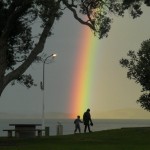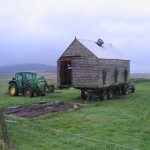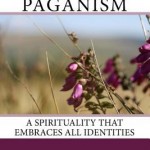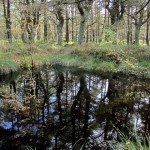Cherry Hill Seminary sponsored a well-received conference this month at the University of South Carolina. Entitled “Sacred Lands and Spiritual Landscapes,” the conference featured historian Ronald Hutton as a keynote speaker and a range of papers on topics such as pilgrimage, the lesbian land movement, witchcraft in urban landscapes, ecotheology, and more. Our own blogger at A Sense of Place, Elinor Predota, presented a paper entitled “Into the Sacred Woods: The Inner and Outer Value of a Pagan Sense of Place” that focused on boys’ experiences in forests.
CHS Executive Director Holli Emore has a nice writeup of the event here, and Patheos Pagan writer John Beckett also attended the conference and has posted his own reflections here and here.
The conference is a great step forward for Cherry Hill Seminary and for Pagan theologians. The American Academy of Religion has been a welcoming home for a religious studies-based approach to Pagan studies, but it does not yet have much of a place for Pagan theology, in other words, scholarship written from a practitioner standpoint for other practitioners. Theology is an academic discipline of its own and is most at home in the culture of a seminary. I hope there will be more conferences from CHS with contributions from both religious studies scholars and theologians in the future.
Today, Teo Bishop posted a call to “crowdsource Pagan theology.” After providing a list of relevant theological “-isms” (polytheism, monism, pantheism, etc.), he writes:
I’m musing on these statements of “truth” on the eve of Beltane, and will continue to do so as I prepare for my joint-presentation on Pagan theology at the annual Beltania Festival in Florence, Colorado. […]
But the more I think about it, the more I believe that it isn’t enough to tell people, “These are the categories of belief. Here’s how it looks on paper.” You have to provide them examples. They need context in order for these -isms to be relevant.
That’s where you come in.
I would like to turn the Wild Hunt’s readership into a lecture-hall of teachers, each of you explaining to the average Pagan noobie what Pagan theology is.
More specifically, what your Pagan theology is.
We’re going to crowdsource theology. That way, when I join William at Beltania I will not just come with my perspective, but I will bring all of yours, as well.
Teo is inviting readers to leave comments on the post at The Wild Hunt explaining Pagan theology in general and one’s personal theology in particular, as well as to tweet theological statements with the hashtag #mypagantheology. It’s a creative use of new internet technologies, and I’ll be interested to see the results and the resulting presentation.
This summer, I’ll be co-teaching a Master’s class on Contemporary Global Paganisms with Sarah Whedon, Chair of the Theology and Religious History Department at Cherry Hill Seminary. We cover contemporary Pagan traditions around the world (using a strict definition of self-identified “Pagan” — cousin earth-based or polytheistic faiths are not included) — yet you may be surprised to find Pagan communities as widely spread as South Africa, Lithuania, and Brazil.
Those new to Paganism may instead be interested in the 4-week Paganism 101, a class that originally developed out of a final student project for Contemporary Global Paganisms. Instructor Selina Rifkin also provides an overview of global Pagan traditions, but at an accessible, community education level (with far fewer heavily-footnoted academic articles ;> ).
















